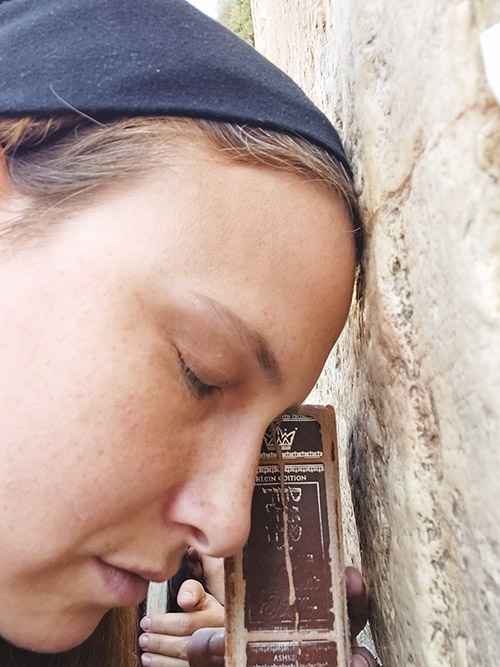
About six months ago, my loving husband and I came to the decision that I should take a mental health reset trip to Israel. I have a lot of close friends there and hadn’t been there since an organized trip in 2009. I was looking forward to seeing the country again, spending quality time with friends, as well as using the time to reflect (with the help of very holy scenery).
I planned for the trip to be two weeks and to depart right after the chagim were over. I was so excited that I got to the airport five hours early. Most of the flight I just watched the flight map to track how close I was to Israel. Ten hours later I arrived and I felt like a fifty-pound weight was taken off of my shoulders. I felt a kind of freedom that I haven’t felt in a long time. It was as if all of my struggles just melted away.
The first week I spent quality time with close friends, eating, shopping, and of course taking in the beautiful surroundings. I was having such a great time, and for the first time in a long time I felt carefree and, like they say in the movie The Lion King, “Hakuna matata.” I had no worries.
But as I was taking a bus back to Jerusalem to go to my next destination, the depression set in. I canceled my plans, got a hotel for two nights and basically isolated for the next two days. I was so upset! How was it possible that my depression followed me on my mental health reset trip? I was having such a wonderful time and yet here I was on an Egged bus crying and seeing no end in sight. Was I naive enough to think that I wouldn’t have a depressive episode just because I was on vacation? I guess I was for just a little bit.
I spent those two days talking to my family on video chat, eating takeout food and candy from Machaneh Yehudah, and binge watching a new TV show. Can’t say I left my bed very much. At first I was mad at myself. How could I let this ruin my trip? It’s not like I haven’t lived with this for over half of my life and didn’t know how to deal with it. I came to the realization that the reason I was so upset about this depressive episode was that it reminded me of how much I’m not in control of my treatment-resistant depression. The only thing I can control is how I react to it invading my life no matter what I am doing or where I am. This time I chose to fight, and fight hard. This was my vacation, my chance to rejuvenate myself. I had planned this trip for months and to the best of my ability, I wasn’t going to let anyone or anything stop me. After I let myself have those two days to get back on track and change my perspective, I was able to have a fantastic time for the rest of the trip.
In hindsight, I was somewhat grateful for my brief depressive episode. It taught me that I was running around too much and not taking enough time to relax, and that in a total of two weeks I only had one 2-day depressive episode that I was able to overcome by myself. The whole of the following week I felt stronger and empowered because of it.
Did I really think that my depression wouldn’t follow me to Israel? Absolutely not. It was probably just wishful thinking on my part to suppose otherwise. Depression, and any mental illness for that matter, is not something you can run away from. It’s something you learn how to live with as best as you can while you’re going about your daily life. It’s a daily struggle and something that you’re always trying to manage.
I am forever grateful to those who enabled this trip of a lifetime to happen. All in all, it was a successful mental health reset trip. I made sure to bring back some physical souvenirs (besides food) that I could look at on a daily basis to remind myself of the trip and all that I have accomplished. I also printed out some of the pictures I took and hung them on the wall next to my bed to look at when I’m struggling, as well as when I’m writing what I’m grateful for each day.
Although I wish my treatment-resistant depression would take its own vacation, in the meantime I’ve accepted and adjusted my mindset to know that it’s coming with me wherever I go.
Shelli Sussman is the founder of RinaLi Mental Health, a comprehensive worksheet of mental health providers recommended by others in the community that can be viewed anonymously. Most of the providers are in network with insurance. For access to the spreadsheets and updates, follow RinaLi Mental Health on Facebook or Instagram, or email Rinalimentalhealth@gmail.com










